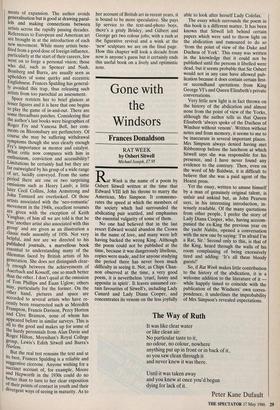Gone with the Windsors
Frances Donaldson
RAT WEEK by Osbert Sitwell Michael Joseph, f7.95 Rat Week is the name of a poem by Osbert Sitwell written at the time that Edward VIII left his throne to marry the American, Mrs Simpson. It commemo- rates the speed at which the members of the society which had surrounded the abdicating pair scuttled, and emphasises the essential vulgarity of some of them. No one had believed that in the last resort Edward would abandon the Crown in the name of love, and many were left having backed the wrong King. Although the poem could not be published at the time, because it was dangerously libellous, copies were made, and for anyone studying the period there has never been much difficulty in seeing it. Not, as Chips Chan- non observed at the time, a very good poem, it is nevertheless 'cruel, funny and apposite in spirit'. It leaves unnamed cer- tain favourites of Sitwell's, including Lady Cunard and Lady Diana Cooper, and concentrates its venom on the less joyfully able to look after herself Lady Colefax.
The essay which surrounds the poem in this book is a different matter. It has been known that Sitwell left behind certain papers which were said to throw light on the abdication and rumoured to do so `from the point of view of the Duke and Duchess of York'. This essay was written in the knowledge that it could not be published until the persons it libelled were dead, but it seems probable that Sir Osbert would not in any case have allowed pub- lication because it does contain certain first- or secondhand quotations from King George VI's and Queen Elizabeth's private conversations.
Very little new light is in fact thrown on the history of the abdication and almost none from the point of view of the Yorks, although the author tells us that Queen Elisabeth 'always spoke of the Duchess of Windsor without venom'. Written without notes and from memory, it seems to me to be inaccurate in several important places. Mrs Simpson always denied having met Ribbentrop before the luncheon at which Sitwell says she was responsible for his presence, and I have never found any evidence to the contrary. Then, even on the word of Mr Baldwin, it is difficult to believe that she was a paid agent of the Hearst press.
Yet the essay, written to amuse himself by a man of genuinely original talent, is unfair and unkind but, as John Pearson says, in his interesting introduction, in- tensely readable. Of the many quotations from other people, I prefer the story of Lady Diana Cooper, who, having acccom- panied the ex-King the previous year on the yacht Nahlin, opened a conversation with the new one by saying: 'I'm afraid I'm a Rat, Sir.' Second only to this, is that of the King, heard through the walls of his room complaining of being excessively tired and adding: 'It's all these bloody guests!'
So, if Rat Week makes little contribution to the history of the abdication, it is a welcome addition to the literature of it while happily timed to coincide with the publication of the Windsors' own corres- pondence, it underlines the improbability of Mrs Simpson's revealed expectations.


















































 Previous page
Previous page